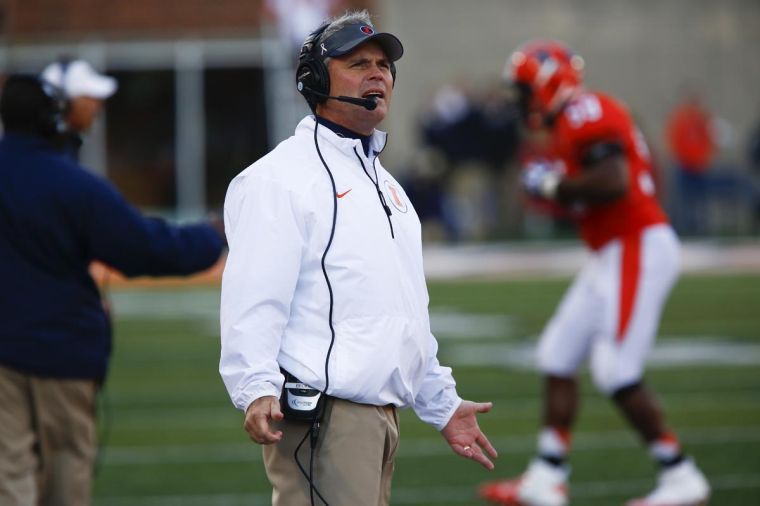Coaches need time to prove their worth
Illinois’ head coach Tim Beckman reacts to a holding call during the homecoming game against Michigan State at Memorial Stadium in Champaign, Ill. on Oct. 27. The Illini lost 42-3.
November 11, 2013
It’s no secret Tim Beckman and John Groce make a lot of money. For the fourth straight year, the head coaches for the University’s football and basketball teams top The Daily Illini’s Salary Guide.
They make more money than anybody else at the University, including their boss, Director of Athletics Mike Thomas, and the chancellor, Phyllis Wise. Together they make $3.3 million a year (Beckman edges out Groce, making $1.7 million compared with Groce’s $1.6 million salary).
Beckman has been at Illinois for just over a season and a half, and has a 5-15 record to show for it. One might look at his salary and wonder why he is paid so much to coach a team that has performed so poorly.
To argue that Beckman or Groce shouldn’t be making so much money is irrelevant, according to one expert in sports policy.
Laurence Chalip, head of the Department of Recreation, Sports and Tourism, said to argue whether Division I college coaches should be paid as much as they are paid is an incorrect argument.
Get The Daily Illini in your inbox!
When a university like Illinois decides it wants to have a Division I athletics program, it has to expect to pay a high price for coaches, primarily in football and men’s basketball.
“To have coaches at the level that we need to have in order to be competitive in these sports — and we choose to be competitive in these sports because we think they are of value to us — when we make that decision, we go into a market for coaches,” Chalip said. “The market for coaches says this is what these guys cost. End of story.”
The market for Division I football and basketball coaches is high. Beckman’s salary is not even close to that of the highest paid D-I college football coach (that would be the $5.54 million that Alabama’s Nick Saban hauls in).
To argue against such high coaching salaries would be to argue against D-I college athletics, Chalip said. Other schools have made that argument.
The University of Chicago, a founding member of the Big Ten and one of the conference’s more successful football programs in its early years, de-emphasized varsity athletics in 1939 and dropped its football program (until 1969; the Maroons now compete in Division-III).
Other universities are successful without D-I athletics (MIT and Caltech, for example). Illinois, like all D-I schools, has chosen to put an emphasis on varsity athletics for a multitude of reasons. And there are certain costs that come with that.
“The coaching salary issue is frankly a nonissue,” Chalip said. “Once we decide to be a D-I college athletics institution, we’re in the marketplace, and we’re going to get what we pay for.”
But is Illinois getting what it’s paying for?
Like any business venture, it takes time to see returns an investment. Chalip thinks athletics programs are often too quick to decide a certain coach isn’t the right fit.
The majority of businesses don’t make a profit the first year, Chalip says, and expectations on coaches should be no different.
“You can’t make a judgment in a year or two accurately,” Chalip said. “If you keep changing your coach, you’re guaranteed to fail for the same reason that if you keep starting up a new business, you’re going to keep failing.”
Beckman is signed through the 2017 football season. From Chalip’s business perspective, he needs to be given more than two seasons before Illinois gives up on him. Groce is signed through the 2017-18 basketball season but undoubtedly has more job security, based on performance.
Both coaching positions require a hefty sum and will continue to do so as long as Illinois competes at the D-I level, which for the foreseeable future isn’t going to change.
“You can’t make an argument that we argue for free markets and against coach salaries,” Chalip said. “It’s an inconsistent argument.”
Sean can be reached at [email protected] and @sean_hammond.
Editor’s note: A previous version of this article incorrectly stated Tim Beckman and John Groce’s salaries as $1.6 million and $1.4 million, respectively. The Daily Illini regrets this error.







